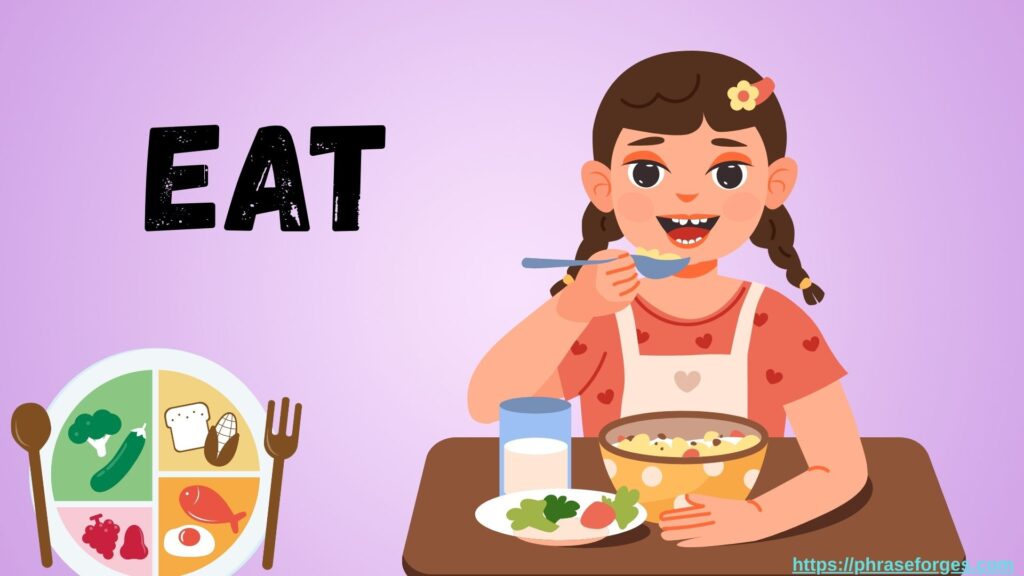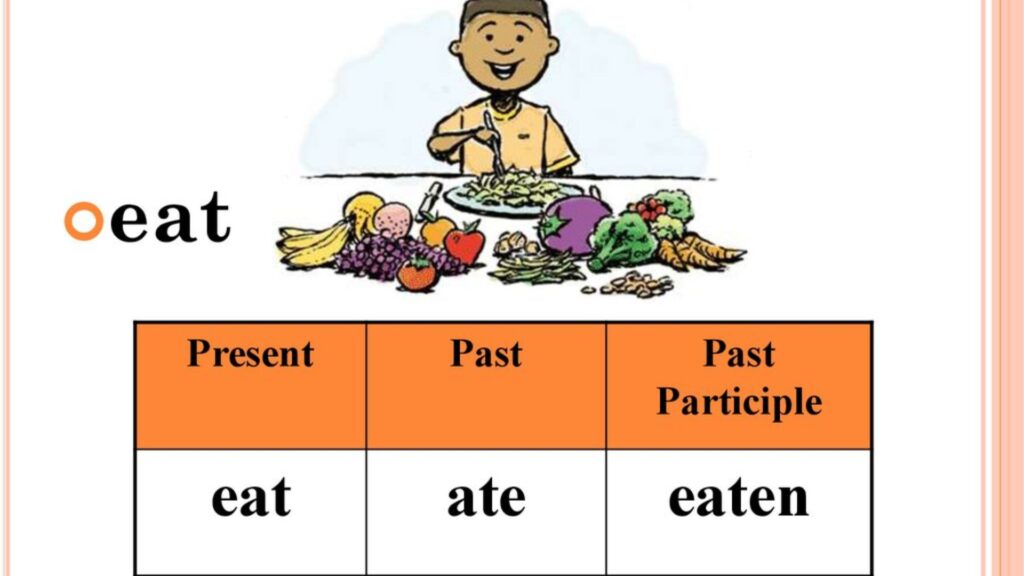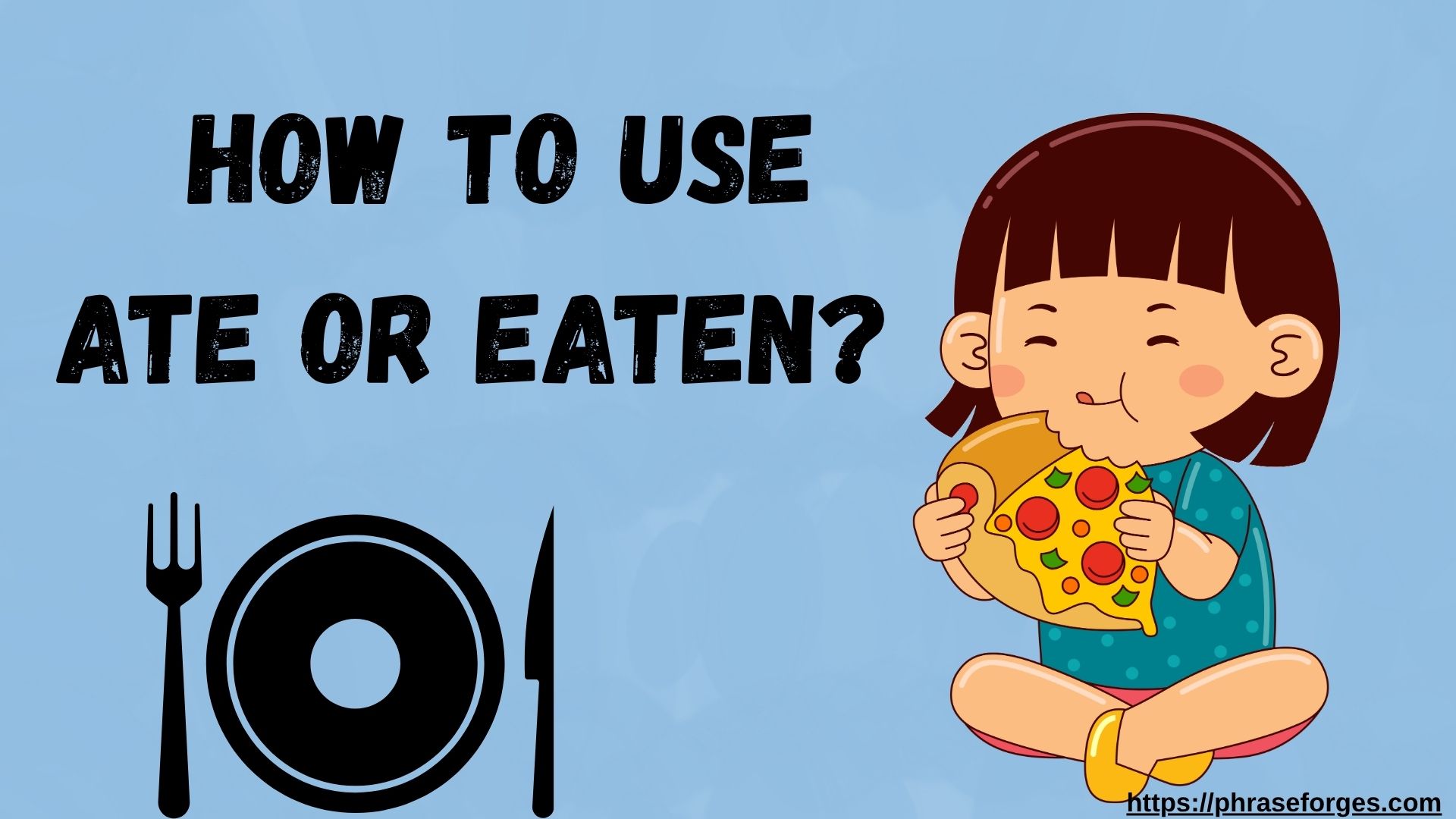English verbs can be tricky, especially when it comes to irregular verb conjugations. One word that often confuses learners is “eat” specifically when to use ate and when to use eaten. Both are correct, but they serve different grammatical purposes. If you’ve ever wondered, “Is it ate or eaten?”, you’re not alone.
In this guide, you’ll learn when to use ate or eaten, see clear rules, review verb tense timelines, and explore real-world examples (including email scenarios) to solidify your understanding.
Eat (Base Verb) and Its Forms

Before diving into usage, here’s a quick overview of verb tenses of eat:
| Tense | Form | Example |
|---|---|---|
| Base Verb | eat | I eat pizza every Friday. |
| Simple Past Tense | ate | I ate pizza last night. |
| Past Participle | eaten | I have eaten pizza already. |
The verb eat follows an irregular pattern, similar to drink – drank – drunk or sing – sang – sung.
When to Use Ate (Simple Past Tense)
The form ate is the simple past tense of eat. Use it to describe an action completed in the past, often tied to a specific time.
✅ Correct Usage:
- I ate a delicious pizza for dinner last night.
- Sarah ate breakfast early this morning.
- We ate together at the new café yesterday.
❌ Incorrect Usage:
- I have ate lunch already. (✗)
→ Correct: I have eaten lunch already.
Scenario Example: Email Using “Ate”
Subject: Team Lunch Recap
Hi Jordan,
Thanks again for joining us yesterday. I ate way too many tacos, and I think we all agreed the salsa was the best part! Let’s plan another lunch next month.
Best,
Megan
When to Use Eaten (Past Participle)
The form eaten is the past participle of eat. It’s used in perfect tenses (present perfect, past perfect, and future perfect) with auxiliary verbs like have, had, or will have.
✅ Correct Usage:
- I have eaten breakfast already. (Present Perfect)
- Dan had eaten by the time we arrived. (Past Perfect)
- By tomorrow evening, we will have eaten at every restaurant on the street. (Future Perfect)
❌ Incorrect Usage:
- She eaten the cake yesterday. (✗)
→ Correct: She ate the cake yesterday.
Scenario Example: Email Using “Eaten”
Subject: Dinner Status
Hey Brian,
Don’t worry about bringing extra food. Everyone has already eaten, and there are leftovers in the fridge.
See you tomorrow,
Alex
Clear Rules & Patterns
Here’s a quick breakdown of when to use ate vs eaten:
- Use “ate” → Simple past, specific event in the past.
- Use “eaten” → Perfect tenses, often linked to another action/time.
- Never use “eaten” without an auxiliary verb (e.g., have, had, will have).
Comparing Tenses with “Eat”
Understanding tense is key to mastering irregular verbs. Here’s how eat works across different tenses:
- Simple Present: I eat lunch at noon.
- Present Continuous: I am eating lunch right now.
- Past Continuous: I was eating when the phone rang.
- Perfect Continuous: I have been eating healthier meals lately.
This progression aligns with English verb conjugation practice and irregular verb list English study tips.
Common Mistakes & Fixes
Here are frequent errors learners make:
- ❌ Yesterday, I eat a big breakfast.
✅ Correct: Yesterday, I ate a big breakfast. - ❌ She eaten the entire cake.
✅ Correct: She has eaten the entire cake. - ❌ I have ate already.
✅ Correct: I have eaten already.
Idiomatic Expressions with “Eat”
English is full of idiomatic phrases tied to “eat,” which can be fun (and confusing):
- Dog-eat-dog → Highly competitive environment.
- Eat crow / humble pie → Admit you were wrong.
- Eat high on the hog → Live luxuriously.
- Grab a bite to eat → Have a quick meal.
Scenario Example: Chat Message with Idioms
Liam: “How’s the new job?”
Nina: “It’s a real dog-eat-dog world out there, but I love it. Just grabbed a quick bite to eat before my next meeting!”
Why This Matters: Verb Tense Comparison

The difference between ate vs eaten is more than memorization it’s tied to understanding simple past vs present perfect tense.
- Simple Past (Ate): Focuses on when something happened.
→ I ate dinner at 7 PM. - Present Perfect (Eaten): Focuses on the experience or result.
→ I have eaten dinner (so I’m not hungry now).
Quick Reference Table: Ate vs Eaten
| Form | Tense | Usage | Example |
|---|---|---|---|
| Ate | Simple Past | Completed action in the past | I ate lunch yesterday. |
| Eaten | Past Participle | Perfect tenses (have/has/had + eaten) | I have eaten already. |
Practical Study Tips
To truly master irregular verb conjugation, try these:
- Make a verb tense timeline for verbs like eat – ate – eaten.
- Write example sentences of ate in past tense and how to use eaten in a sentence.
- Practice with similar verbs: drink – drank – drunk, ring – rang – rung.
- Use grammar worksheets or flashcards for irregular verbs.
Final Thoughts
Knowing how to use ate or eaten isn’t just about grammar drills it’s about fluency. By practicing these tenses in real-world contexts, you’ll naturally avoid mistakes like “I have ate” and speak with confidence. Think of it as learning to “eat an elephant one bite at a time” master one irregular verb, and the rest get easier.

